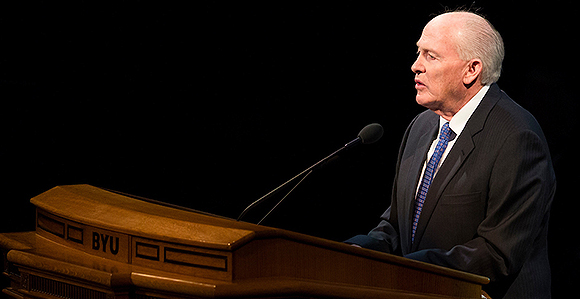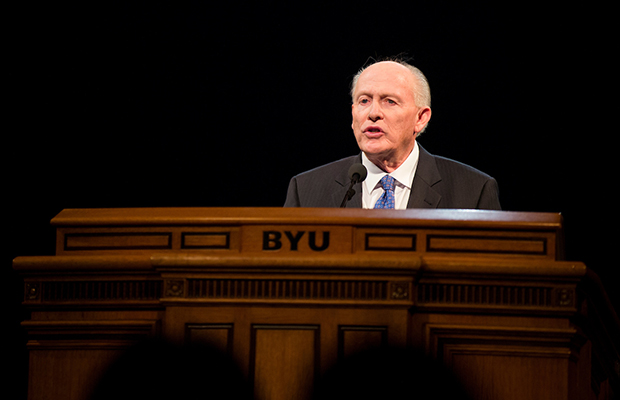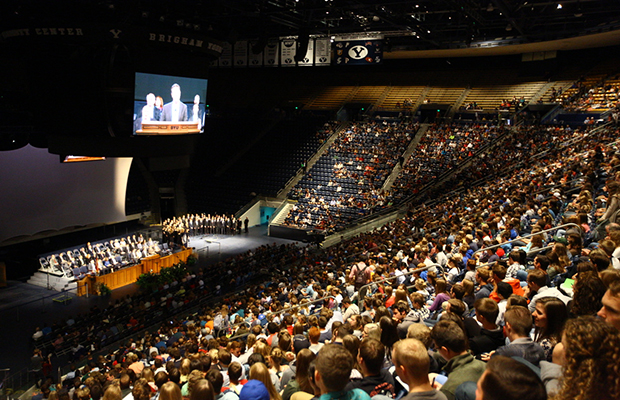Elder Maynes Invites BYU Students to Shape Their Lives through Service
Contributed By Rachel Sterzer, Church News staff writer

Elder Richard J. Maynes of the Presidency of the Seventy gives the campus devotional in the Marriott Center at BYU on September 19, 2017.
Article Highlights
- Doing works of righteousness is the best use of our time.
- The most important question to ask is how we can be more Christlike.
- As we are filled with charity, the pure love of Christ will manifest itself in acts of service.
“Let us examine our lives and determine to follow the Savior’s example by being kind, loving, and charitable.” —President Thomas S. Monson
Related Links
PROVO, UTAH
When Elder Richard J. Maynes arrived at the Brigham Young University campus as a freshman in 1968, he—like many others—was greeted by a large sign on the western edge of campus, which reads “Enter to Learn; Go Forth to Serve.”
Ernest L. Wilkinson, a past president of BYU, adopted the slogan in 1966, and in a speech in 2003, President Gordon B. Hinckley urged every student to make the slogan a personal motto. “Mediocrity will never do,” President Hinckley said. “You are capable of something better. … Walk the high road of charity, respect, and love for others and particularly those who are less fortunate.”
During a BYU campus devotional on Tuesday, September 19, Elder Maynes, a General Authority Seventy, focused his remarks on the gospel principle of service to fellowmen, which “has been the source of the most joy and fulfillment in my life throughout the 43 years since my graduation from this very special institution,” he said.
In beginning his remarks, Elder Maynes asked listeners to take their smartphones out of their pockets, backpacks, or purses and hold them up.
“In terms of raw processing power, the computer in your hand has capabilities far greater than the supercomputers that took up thousands of square feet in the late 1960s and early 1970s, when I attended BYU,” Elder Maynes said.
Through a smartphone, students at any moment have access to more than 40 million Wikipedia articles in 293 languages; 750,000 eBooks on the Kindle; 30 million songs on iTunes, Spotify, or Amazon; and 5,500 movies and TV shows on Netflix. In a single minute, Elder Maynes continued, 500 hours of video are uploaded to YouTube, 448,000 tweets are posted to Twitter, 65,000 photos are posted on Instagram, and 3.3 million posts are made on Facebook. The average user spends 4 hours and 23 minutes online every day.
“With those alarming statistics in mind,” Elder Maynes asked, “how are you spending your time?”
In Doctrine and Covenants 59:23, the Lord reveals that the best use of time is in doing “the works of righteousness.” What are the works of righteousness? In answer, Elder Maynes shared Matthew 22:35–39, where the Lord explains that the great commandment is to “love the Lord thy God with all thy heart, and with all thy soul, and with all thy mind. This is the first and great commandment. And the second is like unto it, Thou shalt love thy neighbour as thyself.”
Similarly, King Benjamin taught, “I tell you these things that ye may learn wisdom; that ye may learn that when ye are in the service of your fellow beings ye are only in the service of your God” (Mosiah 2:17).
Elder Maynes also shared the words of President Thomas S. Monson, who taught in the priesthood session of the last general conference: “Let us examine our lives and determine to follow the Savior’s example by being kind, loving, and charitable. And as we do so, we will be in a better position to call down the powers of heaven for ourselves, for our families, and for our fellow travelers in this sometimes difficult journey back to our heavenly home” (“Kindness, Charity, and Love,” Apr. 2017 general conference).
Elder Maynes told students that questions such as “What should I major in? Should I go on to graduate school? Where will I work?”—while important—are secondary “to the most important questions that relate to your spiritual lives, such as, ‘What can I do to be more Christlike today?’ and ‘Is there someone I can help today?’”
He then quoted a recent Music and the Spoken Word broadcast, which taught: “It’s easy in this self-focused world to become … self-focused. Our needs, our wants, our desires, and ambitions can be so consuming that they crowd out other people. It’s amazing … how often we drown in things that can be so superficial.
“Of course, few would fault a person for seeking to improve his or her life and living with purpose and goals. But when our pursuit of personal growth and happiness causes us to ignore others, it becomes selfishness, and that leads to stagnation, not growth; despair, not happiness; and, ultimately, loneliness. [Elder Neal A. Maxwell] put it this way: ‘Why worry about selfishness? … Because selfishness is really self-destruction in slow motion’” (“A Better Self and a Better World,” Music and the Spoken Word, Apr. 30, 2017).
Noting that it can be difficult to find appropriate service opportunities to fit into busy schedules, Elder Maynes discussed the JustServe initiative, which the JustServe Community Service Guidebook defines as “a community service initiative to help Church members follow the Savior’s admonition to ‘love thy neighbour as thyself’ (Matthew 22:39) by providing a platform where members and missionaries can find … opportunities to relieve suffering, care for the poor and needy, and enhance the quality of life in the community.”
Elder Maynes encouraged listeners at the conclusion of his address to download the JustServe app. After typing in a zip code, users will see what projects have been posted in their area. “The last time I entered Provo, over 280 projects within 25 miles came up to choose from. I’m sure you’ll be able to find one that interests you,” Elder Maynes said. “There are projects to help clean up the community, projects to help support our veterans, projects to help support the elderly, projects to help in food banks and food kitchens, projects to help refugees, and the list goes on and on.”
In describing the role service can take in an individual’s life, Elder Maynes quoted President Monson, who said, “Unless we lose ourselves in service to others, there is little purpose in our own lives” (“What Have I Done for Someone Today?” Oct. 2009 general conference).
Elder Maynes admitted that although he is far from perfect in applying this doctrine in his own life, he has found a way to help deepen his understanding and commitment to living it. “When we speak of shaping our lives through service to others, we are really speaking of living a charitable, Christlike life,” he taught. “The Bible Dictionary defines charity as ‘the highest, noblest, strongest kind of love, not merely affection.’ For me, charity, or the pure love of Christ, is a condition of the heart. Charity motivates people to do the right thing for the right reason. Charity particularly motivates a person to do something that is difficult or maybe even impossible for others to do for themselves.”
In conclusion he quoted Moroni 7:48, saying, “Brothers and sisters, it is my prayer today that we might all ‘pray unto the Father with all the energy of heart’; that we may be filled with the love we call charity, the pure love of Christ; and that pure love will manifest itself in Christlike service to others.”

Elder Richard J. Maynes of the Presidency of the Seventy offers the campus devotional in the Marriott Center at BYU on September 19, 2017. Photo by Gabriel Mayberry.

Students and faculty fill the Marriott Center on the BYU campus as Elder Richard J. Maynes of the Presidency of the Seventy gives the devotional address on September 19, 2017. Photo by Gabriel Mayberry.
